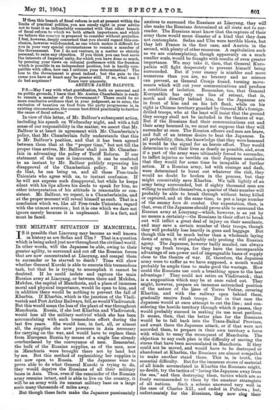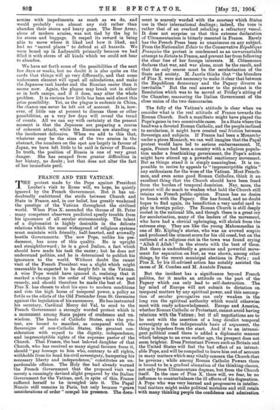IS it possible that Liaoyang may become as well known
history as are Sedan and Ulm? That is a question which is being asked just now throughout the civilised world. In other words, will the Japanese be able, owing to their greater agility, to surround and cut off the Russian forces that are now concentrated at Liaoyang, and compel them to surrender or be starved to death ? Time will show whether General Kuroki is able to execute this tremendous task, but that he is trying to accomplish it cannot be doubted. If he could isolate and capture the main Russian army at Lia,oyang, or between there and Mukden, Mukden, the capital of Manchuria, and a place of immense moral and physical importance, would lie open to him, and in addition there would be nothing to prevent the fall of Kharbin. If Kharbin, which is the junction of the Vladi- vostok and Port Arthur Railways, fell, so would Vladivostok. But this would mean the loss of the plant of war throughout Manchuria. Russia, if she lost Kharbin and Vladivostok, would lose all the military materiel which she has been acccumulating with such tremendous effort during the last five years. She would lose, in fact, all, or almost all, the supplies she now possesses in Asia necessary for carrying on the war, and would have to replace them from European Russia by means of a single line already overburdened by the conveyance of men. Remember, the bulk of the Russian supplies, as of the men, now in Manchuria were brought there not by land but by sea. But this method of replenishing her supplies is not now open to Russia. If the Japanese were to prove able to do what General Kuroki is trying to do, they would deprive the Russians of all their military bases in Asia. Thus, even if the remainder of the Russian army remains intact, and is able to live on the country, it will be an army with its nearest military base on a large scale many thousands of miles away.
But though these facts make the Japanese passionately anxious to surround the Russians at Liaoyang, they wilt also make the Russians determined at all costs not to sur- render. The Russians must know that the capture of their army there would mean disaster of a kind that they dare not contemplate. Sedan and Ulm were terrible blows, but they left France in the first case, and Austria in the second, with plenty of other resources. A capitulation such as we are contemplating, though apparently on a much smaller scale, would be fraught with results of even greater importance. We may take it, then, that General Kuro- patkin will fight desperately to prevent himself being surrounded. But if your enemy is nimbler and more numerous than you are, no bravery and no science can prevent, as General Cronje found, turning move- ments which will cut your communications and produce a condition of isolation. Remember, too, that General Kuropatkin has only one line of retreat, that is, north and directly behind him, for the Japanese are in front of him and on his left flank, while on his right is Chinese territory guarded by General Ma's foreign- drilled troops, who at the least will insist that the ground they occupy shall not be included in the theatre of war. But if the Russians find their communications cut and their army hemmed in, we must not suppose that they will surrender at once. The Russian officers and men are brave, and full of an intense desire to beat the Japanese. In all probability, then, the knowledge that they were hemmed in would be the signal for an heroic effort. They would determine to sell their lives as dearly as possible, and, even if a part of the army were ultimately forced to surrender, to inflict injuries so terrible on their Japanese assailants that they would for some time be incapable of further action. If a Russian army, led with courage and dash, were determined to burst out whatever the risk, they would no doubt be broken in the process, but they might conceivably save Kharbin. We talk lightly of an army being surrounded, but if eighty thousand men are willing to sacrifice themselves, a quarter of their number will probably be able to break through without being killed or captured, and at the same time, to put a large number of the enemy hors de combat. Our expectation, then, is that, even if the Japanese should prove able to surround the Russian army at Liaoyang—which, however, is as yet by no means a certainty—the Russians in their effort to break out will inflict a great deal of injury on their assailants, and may save a certain number of their troops, though they will probably lose heavily in guns and baggage. But though this will be much better than a wholesale laying down of arms, it will probably only prolong the Russian agony. The Japanese, however badly mauled, can always bring up fresh troops, for they have the incomparable advantage of sea-power and of impregnable bases of supply close to the theatre of war. If, therefore, the Japanese army were to suffer as we have supposed, a month would probably be ample time to make good the wastage. How could the Russians use such a breathing space to the best advantage ? They could not retire on Vladivostok ; that is a supposition which may be at once ruled out. They might, however, prepare an immense entrenched position of the nature of the lines of Torres Vedras, covering Kharbin, and with the railway open behind them, gradually receive fresh troops. But in that case the Japanese would at once attempt to cut the line ; and con- sidering the hostile territory through which it passes, they would probably succeed in making its use most perilous. It seems, then, that the better plan for the Russians would be to fall back into the Trans-Baikal Province, and await there the Japanese attack, or if that were not accorded them, to prepare in their own territory a force with which to essay the reconquest of Manchuria. The objection to any such plan is the difficulty of moving the stores that have been accumulated in Manchuria. If they could not be moved, and would have to be destroyed or abandoned at Kharbin, the Russians are almost compelled to make another stand there. This is, in truth, the essential difficulty. But for the immense stores of material of all kinds accumulated in Kharbin the Russians might, no doubt, try the tactics of "luring the Japanese away from the sea," and then destroying them, tactics which are so freely recommended to them by the amateur strategists of all nations. Such a scheme answered very well in the case of Charles- XII., and ended in Pultowa ; but, unfortunately for the Russians, they now clog their armies with impedimenta as much as we do, and would probably run almost any risk rather than abandon their stores and heavy guns. The Boer Army, alone of modern armies, was not tied by the leg to its stores and baggage. It reaped its reward in being able to move where it liked and how it liked, and had no "sacred places" to defend at all hazards. We were boxed up in Ladysmith primarily because we had filled it with stores of all kinds which we could not bear to abandon.
We have set. forth some of the possibilities of the next few days or weeks, but no doubt it is also quite on the cards that things will go very differently, and that some unforeseen element will upset all calculations, and make the Japanese task harder and the Russian easier than it seems slow. Again, the plague may break out in either or in both camps, and if it does, may alter the whole problem. It is curious how little has been said about this grim possibility. Yet, as the plague is endemic in China, the chance can never be left out of account. It is, how- ever, of little use at present to discuss these or other possibilities, as a very few days will reveal the trend of events. All we can say with certainty at the present moment is that the Japanese are preparing a course of coherent attack, while the Russians are standing on the incoherent defensive. When we add to this that, whatever may be the sizes of the two armies in the abstract, the numbers on the spot are largely in favour of Japan, we have left little to be said in favour of Russia. In truth, the position of Russia is one of very great danger. She has escaped from greater difficulties in her history, no doubt ; but that does not alter the fact of her immediate peril.



































 Previous page
Previous page